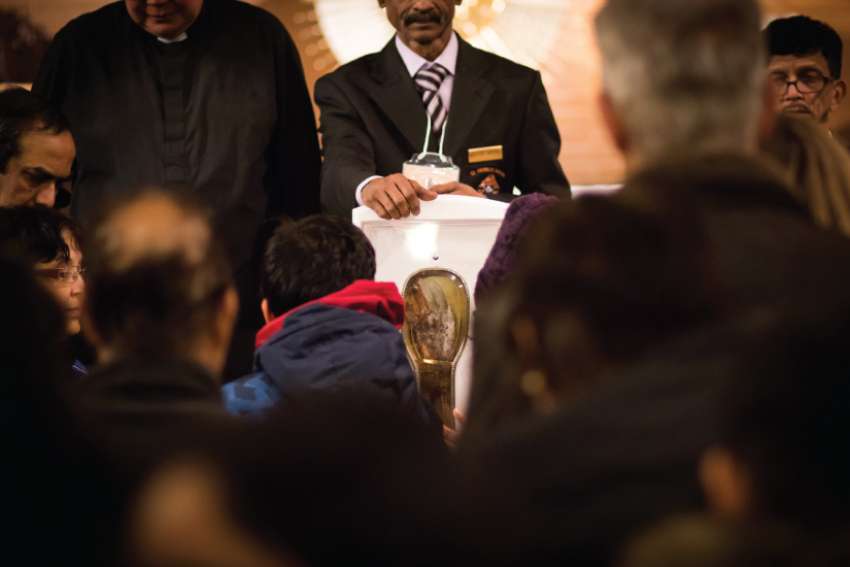St. Francis Xavier relic highlights vital role of immigrants
By Fr. Raymond J. de SouzaMississauga is likely the most religiously-observant part of Canada. Immigration has brought observant believers from all parts of the world, and the religious diversity is evident from the number of large churches, mosques and temples in Mississauga and nearby. But it is not only religious diversity that is noteworthy, but religious intensity. The norm for Catholic parishes in Mississauga is five, six or seven Sunday Masses, all of which are packed.
So the scene at St. Francis Xavier on Jan. 6 for the relic pilgrimage was impressive but not surprising. The parishioners knew what to expect and prepared for it. There were 120 (!) volunteers to receive the pilgrims.
That itself poses a challenge. How do you look after 120 volunteers who are on-site from 7 a.m. to evening? The parish had another group of about 20 volunteers to provide breakfast and lunch for the first group.
This is all largely driven by Catholic immigration from India and the subcontinent, and the Philippines. All of which made the visit of St. Francis Xavier, missionary to the Indies and the East, a good occasion to reflect upon the mission of immigrant Catholics.
The first reality is obvious: to save the Church from death. Leaving aside the unique crisis in Quebec, in areas that attract relatively few immigrants from Asia — Atlantic Canada, rural Canada — the Church is already dead in many places and dying elsewhere. The abandonment of the faith by the descendants of European immigrants means the practical disappearance of the Catholic faith — unless immigrants from Asia (and clergy from Asia and Africa) take their place.
When the relic visited Atlantic Canada, local officials told the organizers not to expect many people, and they were shocked when large numbers came. In St. John’s, Nfld., priests in their magnificent basilica were dumbfounded that pilgrims came (approximately 1,800) and that many wanted to go to confession.
There was no such surprise in Mississauga, where immigration has made the Church vibrant.
Which makes clear the existential challenge for the Church in Canada over the next two generations. The French and Irish, who sustained the Church for generations, have lost their numbers and their zeal. Will the next generations of Indian and Filipino immigrants follow the same path, or will they be able to continue the patterns of observance of their parents? The future of Catholicism in Canada depends upon it.
The highlight for me of the day was the noon Mass for the Goan community, at which Fr. Edwin Gonsalves, rector of St. Augustine’s Seminary, was the principal celebrant. I was given the honour of preaching. And the question of the immigrant mission to Canada was what I suggested we reflect upon.
We came to Canada to seek a better life. But how do we measure that better life in Canada?
What does it profit us Goans if we have built a better life in Canada but neglect our life of faith, and put in doubt the gift of eternal life? What does it profit us that we have succeeded in business and the professions? What does it profit us if we have succeeded in Canada if we lose what is the most precious heart of our culture — the Gospel of Jesus Christ?
St. Francis Xavier did not travel to Goa to make the Portuguese colony more successful, more prosperous, or even more just.
And so if our presence does not make this land more holy, what it is the point of our being here? Did God bring us here so that this land would have more more workers and entrepreneurs and taxpayers? Or did He bring us here that this land might have more saints?
(Fr. de Souza is the editor-in-chief of Convivium.ca and a pastor in the archdiocese of Kingston.)
Please support The Catholic Register
Unlike many media companies, The Catholic Register has never charged readers for access to the news and information on our website. We want to keep our award-winning journalism as widely available as possible. But we need your help.
For more than 125 years, The Register has been a trusted source of faith-based journalism. By making even a small donation you help ensure our future as an important voice in the Catholic Church. If you support the mission of Catholic journalism, please donate today. Thank you.
DONATE

